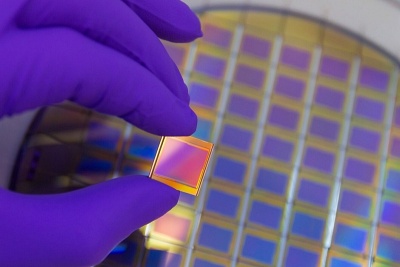Collaboration combines CMOS-based infrared sensor with 1300 nm emitter array.

SWIR sensing with CMOS
A partnership between Israeli camera developer TriEye and Germany-based laser diode specialist Vertilas has realized a novel long-range sensor operating in the short-wave infrared (SWIR) spectral region.
The setup combines TriEye’s low-cost SWIR sensors, which are fabricated using silicon CMOS processing, with vertical-cavity surface-emitting lasers (VCSEL) arrays operating at the relatively long wavelengths enabled by indium phosphide (InP) material.
Demonstrated for the first time at this week’s Compound Semiconductor International Conference in Brussels, the technology is being touted as a mass-producible option for advanced SWIR sensing that could be used across numerous consumer and industrial applications.
Cost-effective option
“The system highlights the capabilities of TriEye's CMOS-based SWIR sensor, noted for its high sensitivity and 1.3 megapixel resolution,” announced the two firms.
“Designed to enhance imaging in various industries, including automotive, consumer, biometrics, and mobile robots, this solution represents a significant step forward in sensing technology.
“Deploying 1.3 µm VCSEL arrays enables greatly improved eye safety and signal quality while minimizing sunlight distortion. Vertilas InP VCSEL array technology also offers wavelengths at 1.55-2 µm. This new technology is expected to broaden the scope of applications in imaging and illumination across multiple industries.”
Vertilas CEO Christian Neumeyr said: “Our InP VCSEL technology, combined with TriEye's exceptional SWIR sensor, marks a significant advancement in the realm of imaging and illumination solutions.
“This collaboration is more than just a technological achievement; it represents our shared vision of innovating for a better, more efficient future in both consumer and industrial applications.”
Avi Bakal, his counterpart at TriEye, added: “At TriEye, our commitment has always been to bring revolutionary SWIR technology to the forefront of the market. The integration of our SWIR sensor with Vertilas InP VCSEL technology in this collaborative venture is a testament to this mission.
“We are proud to unveil a solution that not only enhances imaging capabilities across various industries but also does so in a cost-effective and scalable manner, making advanced sensing technology more accessible than ever.”
ADAS applications
The Tel Aviv startup, which in 2021 closed a $74 million funding round backed by Intel, Samsung, and Porsche, has previously collaborated with leading auto parts provider Hitachi Astemo on a novel infrared sensor for advanced driver assistance systems (ADAS) applications.
Its sensors can also be combined with edge-emitting laser diodes, as showcased during last year’s LASER World of Photonics trade show in Munich.
Industry giant Coherent featured a TriEye sensor combined with a 1375 nm edge-emitting laser illuminator on its booth, saying that the technology was to be aimed at mass-market applications in all-weather imaging in the automotive and industrial robotics sectors.
Spun out of Munich’s Walter Schottky Institute more than 20 years ago, Vertilas has pioneered the development of long-wavelength VCSELs fabricated on InP wafers.
Its high-efficiency designs typically offer optical output powers of up to 5 mW, at wavelengths ranging from 1.3-2.3 µm, that are aimed at applications ranging from gas sensing to optical communications.
TrendForce 2024 Infrared Sensing Application Market and Branding Strategies
Release: 01 January 2024
Format: PDF
Language: Traditional Chinese / English
Page: 172
|
If you would like to know more details , please contact:
|












